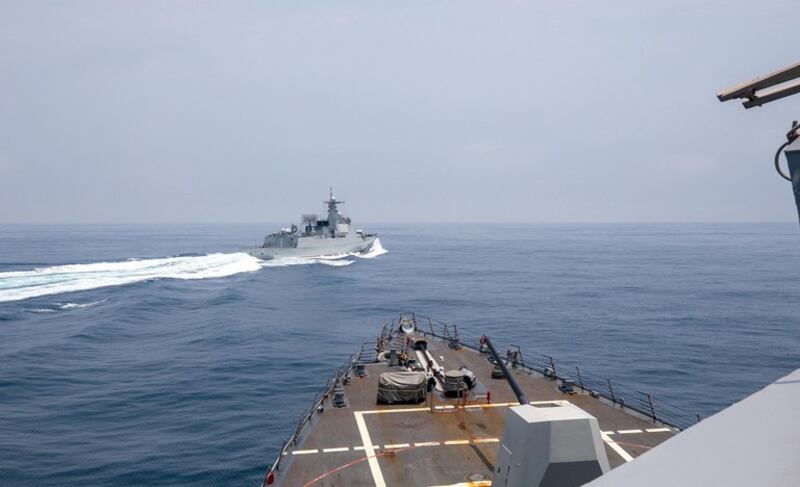U.S. and Chinese military officials met in Washington this week for their first face-to-face talks in more than two years, as the world’s two major powers wade further into a detente after nearly a year of animosity.
The status of Taiwan, which derailed U.S.-Chinese relations nearly 18 months ago, was high on the agenda, with the democratic island that Beijing claims as its territory set to hold a pivotal election this weekend.
Michael Chase, deputy assistant secretary of defense for China, met Maj. Gen. Song Yanchao, deputy director of international military cooperation in China's Central Military Commission, on Monday and Tuesday, according to a statement from the Pentagon.
It was the first Defense Policy Coordination Talks since 2021, with China's military leaders refusing to speak with their U.S. counterparts following then-House Speaker Nancy Pelosi's August 2022 trip to the self-governing island of Taiwan.
Direct military-to-military talks were only restored after U.S. President Joe Biden and Chinese President Xi Jinping's summit in San Francisco in November during the Asia-Pacific Economic Cooperation meeting.
The Pentagon said that the two military officials “discussed regional and global security issues” and that Chase “highlighted the importance of maintaining open lines of military-to-military communication in order to prevent competition from veering into conflict.”
U.S. defense officials last year criticized Chinese military leaders for refusing to pick up the phone amid a surge in near-accidents between military ships and jets over the South China Sea and Taiwan Strait.
Chase also "reaffirmed that the United States will continue to fly, sail, and operate safely and responsibly wherever international law allows," the Pentagon said, referring to U.S. " freedom of navigation" operations through the South China Sea, which China claims as its territory.
Red lines
China's military said in its own readout that it was "willing to develop a sound and stable military-to-military relationship with the U.S. side on the basis of equality and respect" as agreed upon in San Francisco.
But it added Washington “needs to take seriously China's concerns and do more things that contribute to the growth of the mil-mil relationship,” such as reducing its “military presence” in the South China Sea.

“The Chinese side underscored that the U.S. side should fully recognize the root cause of maritime and air security issues, strictly discipline its troops on the ground, and stop manipulating and hyping-up relevant issues,” the Chinese readout said.
It added that Beijing “will not make any concession or compromise on the Taiwan question” and called for America to “stop arming Taiwan.”
Taiwan is scheduled to hold a presidential election on Saturday, with the incumbent Vice President Lai Ching-te, who has described himself as a "pragmatic worker for Taiwan independence," a front-runner to replace President Tsai Ing-wen, who cannot run for a third term.
The opposition Kuomintang, meanwhile, has pledged to work more closely with Beijing if it wins back power after eight years out of office.
Pentagon spokesman Pat Ryder said Tuesday that American policy on Taiwan “will remain the same regardless of which party is in power” and that U.S. officials would work “with whomever Taiwan voters elect.”
“We strongly support Taiwan's free and fair elections, which we view as a model for democracy not only in the region but also globally, and the United States does not take sides in Taiwan's elections,” Ryder said. “We’re committed to fair treatment of the candidates.”
Tinderbox
Whatever inroads have been made toward a detente, the lasting disagreements over the status of Taiwan and the South China Sea seem destined to throw a spanner in the works for relations.
In its analysis of the talks, for instance, China's state-run Global Times said the meeting "signifies China's genuine efforts to stabilize relations," but that American leaders should tread carefully.

“It is important for the U.S. to understand China's strong message against colluding with Taiwan secessionists, particularly in the lead-up to Taiwan's regional leader election,” it said, referring to the presidential election, and threatening “harsh measures from [the] Chinese mainland.”
In that situation, it said, “the U.S. will also be put in [a] dilemma.”
Such threats may soon be put to the test, with Taiwan’s next leader – particularly if Lai wins – likely to float an invitation for a delegation of American lawmakers to visit the island for the inauguration ceremony.
At a preview of Taiwan’s election hosted by Politico on Wednesday, Rep. Raja Krishnamoorthi, a Democrat from Illinois who serves as his party’s ranking member on the House Select Committee on China, demurred when asked if he would sign-on to such a delegation.
The lawmaker, who was part of Pelosi’s controversial 2021 trip to Taiwan, instead alluded to the official U.S. policy on whether it would defend the island in the case of an invasion by mainland China.
“You know, I think I'm gonna have to maintain a little bit of strategic ambiguity here,” Krishnamoorthi said.
Edited by Malcolm Foster.
